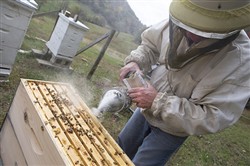Keeper continues lifelong fascination with all things bees
Published in The Nashville Ledger, Nov. 27, 2015
 Joel White uses smoke to calm the bees before checking on the colonies.
-- Michelle Morrow | The Ledger
Joel White uses smoke to calm the bees before checking on the colonies.
-- Michelle Morrow | The Ledger
Joel White’s fascination with bees began in 1975 when one of his college coaches took him out to some apiaries to show him around.
He was hooked, and kept his own bees for the next eight years.
By the time he decided to give it up to advance his career and spend more time with his family, he had over 20 colonies of bees.
Yet, White’s fascination with bees didn’t go away, and after retiring as a teacher he decided to get back into beekeeping.
Today, he has 40 colonies, sells honey and instructs classes on beekeeping in the Nashville area.
“Everything about bees fascinates me,” White says.
“From the queen to how the colony works together to do what they do. They are just fascinating.”
White, who is president of the Nashville Area Beekeepers Association and a member of the Tennessee Beekeepers Association, says education is one of the most important factors for the future of beekeeping.
“The purpose of our association is teaching,” White explains. “When you’re trying to keep bees alive, experience is a huge part.”
When asked about the honeybee decline, White agrees with most experts looking at the research that Varroa mites are one of the biggest problems facing honeybee colonies.
“If you want to keep bees, you have to deal with mites,” White notes. “This fall, I had high mite counts in all of my hives except for three.”
In an attempt to save as many bees as possible, White combined his colonies to strengthen the hives.
White doesn’t discount the role pesticides play in honeybee decline and encourages people to cut back on the pesticide use in their backyards.
“If you see something blooming, don’t spray it,” White says.
“It’s okay to live with a little clover in your backyard, too.”
Another factor in honeybee decline is weather.
During the 2014-15 winter, beekeepers in Middle Tennessee experienced some colony loss because of too much rain, and the bees could not get out and collect pollen for their hives.
Surveys of bee colonies in the state help White and others keep track of the overall health of bees in Tennessee.
During this year’s spring survey, they discovered a 20 percent loss of bee colonies last winter.
White was not too discouraged with this number.
“We’re probably doing better than the rest of the country, which is at a 30 to 40 percent loss,” White adds, saying he has hopes for the future of beekeeping and pollinators.
“I think the future of beekeeping is good because of the number of people getting into it.
“The key is to get younger generations involved.”
White and his fellow beekeepers offer two courses through the Nashville Area Beekeepers Association.
One is a beginning beekeeper class that is designed to provide information on how to become a successful beekeeper.
The course includes topics ranging from the biology of bees and how to set up hives to pests and diseases that affect honeybee colonies.
The advanced beekeeping course features experts who share their experiences with beekeeping and provide information for individuals interested in advancing their own knowledge of bees and beekeeping.
The chef for Nashville’s Music City Center took a class last year, and according to White, there are four colonies of bees at the Music City Center in Downtown Nashville.
Another potential location for a hive or two is the Governor’s Mansion.
Losing colonies can be very discouraging for beginning beekeepers, which is why White stresses the importance of education.
People who have learned what to look for and have the experience of keeping bees are more likely to recognize a problem in the hive and be able to alleviate the problem.
“My philosophy is you can be a bee-haver or a beekeeper,” White says.
“If you’re a bee-haver, you won’t have bees for long. If you’re a beekeeper, you have a better chance of keeping your bees alive.”
Whether you want to keep a hive to make honey or establish a colony of bees to support local pollinators, understanding the biology of bees and the threats to bee colonies is the first step to a successful career as backyard beekeeper and enthusiast, he adds.
Leave a comment